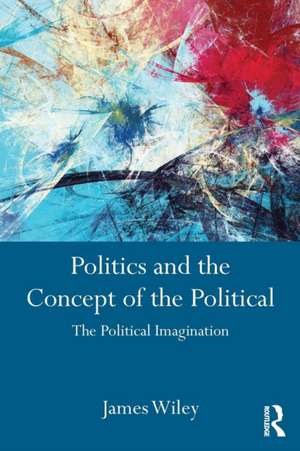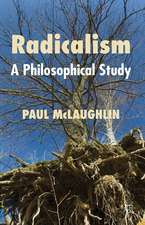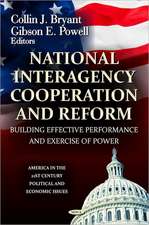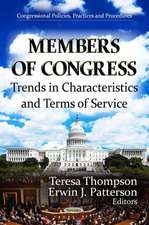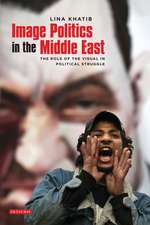Politics and the Concept of the Political: The Political Imagination
Autor James Wileyen Limba Engleză Paperback – 7 iun 2016
Politics and the Concept of the Political will be a useful resource to general audiences as well as to specialists in political theory.
| Toate formatele și edițiile | Preț | Express |
|---|---|---|
| Paperback (1) | 415.29 lei 6-8 săpt. | |
| Taylor & Francis – 7 iun 2016 | 415.29 lei 6-8 săpt. | |
| Hardback (1) | 1113.12 lei 6-8 săpt. | |
| Taylor & Francis – 21 iun 2016 | 1113.12 lei 6-8 săpt. |
Preț: 415.29 lei
Nou
Puncte Express: 623
Preț estimativ în valută:
79.46€ • 82.97$ • 65.77£
79.46€ • 82.97$ • 65.77£
Carte tipărită la comandă
Livrare economică 05-19 aprilie
Preluare comenzi: 021 569.72.76
Specificații
ISBN-13: 9781138185821
ISBN-10: 1138185825
Pagini: 310
Dimensiuni: 152 x 229 x 21 mm
Greutate: 0.43 kg
Ediția:1
Editura: Taylor & Francis
Colecția Routledge
Locul publicării:Oxford, United Kingdom
ISBN-10: 1138185825
Pagini: 310
Dimensiuni: 152 x 229 x 21 mm
Greutate: 0.43 kg
Ediția:1
Editura: Taylor & Francis
Colecția Routledge
Locul publicării:Oxford, United Kingdom
Public țintă
Postgraduate and UndergraduateCuprins
1. The Status of Politics and the Political
Part I: The State
2.Realism: Weber
3.Absolutism, Fascism and Authoritarianism: Schmitt
4. Idealism: Ricoeur
Part II: The Polis
5. Public and Private, Self and World: Arendt
6. The Social, the Political and Democracy: Wolin
Part III: Society
7. Economics, Culture and the Political: Lefort, Laclau and Mouffe
8. Theories of the Political, Political Theory and Politics
Part I: The State
2.Realism: Weber
3.Absolutism, Fascism and Authoritarianism: Schmitt
4. Idealism: Ricoeur
Part II: The Polis
5. Public and Private, Self and World: Arendt
6. The Social, the Political and Democracy: Wolin
Part III: Society
7. Economics, Culture and the Political: Lefort, Laclau and Mouffe
8. Theories of the Political, Political Theory and Politics
Notă biografică
James Wiley has a Ph.D. in Political Theory from The Johns Hopkins University and has taught political theory and political science at the University of Rhode Island, Western Michigan University, the University of Delaware, St. Norbert College, the University of North Florida, John Carroll University, and the College of Wooster. He is the author of Theory and Practice in the Philosophy of David Hume (Palgrave Macmillan 2012).
Recenzii
ESSENTIAL by Choice
This book is an ambitious attempt to correct political theory that aims to "overcome" politics by subordinating it to something else, like moral theory. Instead, Wiley suggests that the accounts of "the political" offered by a number of theorists, including Weber, Wolin, and Mouffe, show how to articulate a "politics-centered" political theory. These theorists together present multiple conceptions of "the political" based in either the state, the polis, or society, and each account allows for a non-subordinate relationship between politics and ethics or philosophy. (Wiley identifies these relationships as "asymmetrical," but does not get much mileage out of the term.) By "putting politics back in" to political theory, Wiley generates a number of wide-ranging practical implications, from countering International Relations theorists' myopic focus on the state to cataloging 19th-century populism's move from an economic to a political perspective on the economy. Theorists and political scientists alike may quibble with these kind of arguments in the book—and there are many of them—but overall, Wiley presents an important model of how to connect political theory to the rest of the discipline. Put another way, the book may not have much to offer social scientists uninterested in high-level theorizing, but is essential reading for political theorists. – Summing Up: Essential. Graduate Students and Faculty' - R. J. Meagher, Randolph-Macon College, CHOICE
'This book establishes a much-needed line of communication between broadly postmodern theories of politics and the new political realism.' – Enzo Rossi, University of Amsterdam, The Netherlands
This book is an ambitious attempt to correct political theory that aims to "overcome" politics by subordinating it to something else, like moral theory. Instead, Wiley suggests that the accounts of "the political" offered by a number of theorists, including Weber, Wolin, and Mouffe, show how to articulate a "politics-centered" political theory. These theorists together present multiple conceptions of "the political" based in either the state, the polis, or society, and each account allows for a non-subordinate relationship between politics and ethics or philosophy. (Wiley identifies these relationships as "asymmetrical," but does not get much mileage out of the term.) By "putting politics back in" to political theory, Wiley generates a number of wide-ranging practical implications, from countering International Relations theorists' myopic focus on the state to cataloging 19th-century populism's move from an economic to a political perspective on the economy. Theorists and political scientists alike may quibble with these kind of arguments in the book—and there are many of them—but overall, Wiley presents an important model of how to connect political theory to the rest of the discipline. Put another way, the book may not have much to offer social scientists uninterested in high-level theorizing, but is essential reading for political theorists. – Summing Up: Essential. Graduate Students and Faculty' - R. J. Meagher, Randolph-Macon College, CHOICE
'This book establishes a much-needed line of communication between broadly postmodern theories of politics and the new political realism.' – Enzo Rossi, University of Amsterdam, The Netherlands
Descriere
What is the meaning and value of politics? James Wiley takes the "next step," from criticizing political theory, to showing what a more "politics-centered" political theory might look like.
